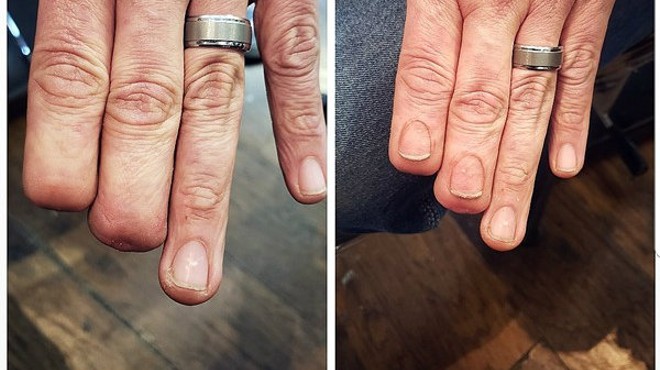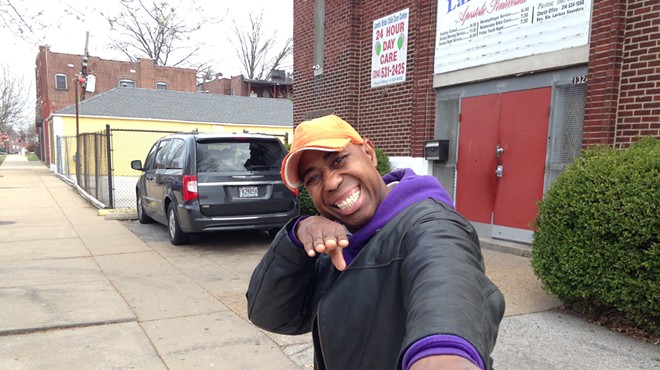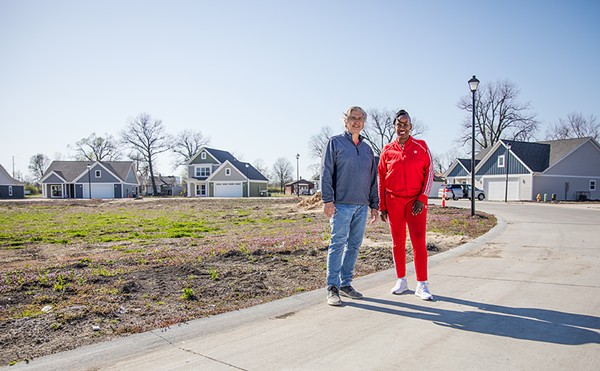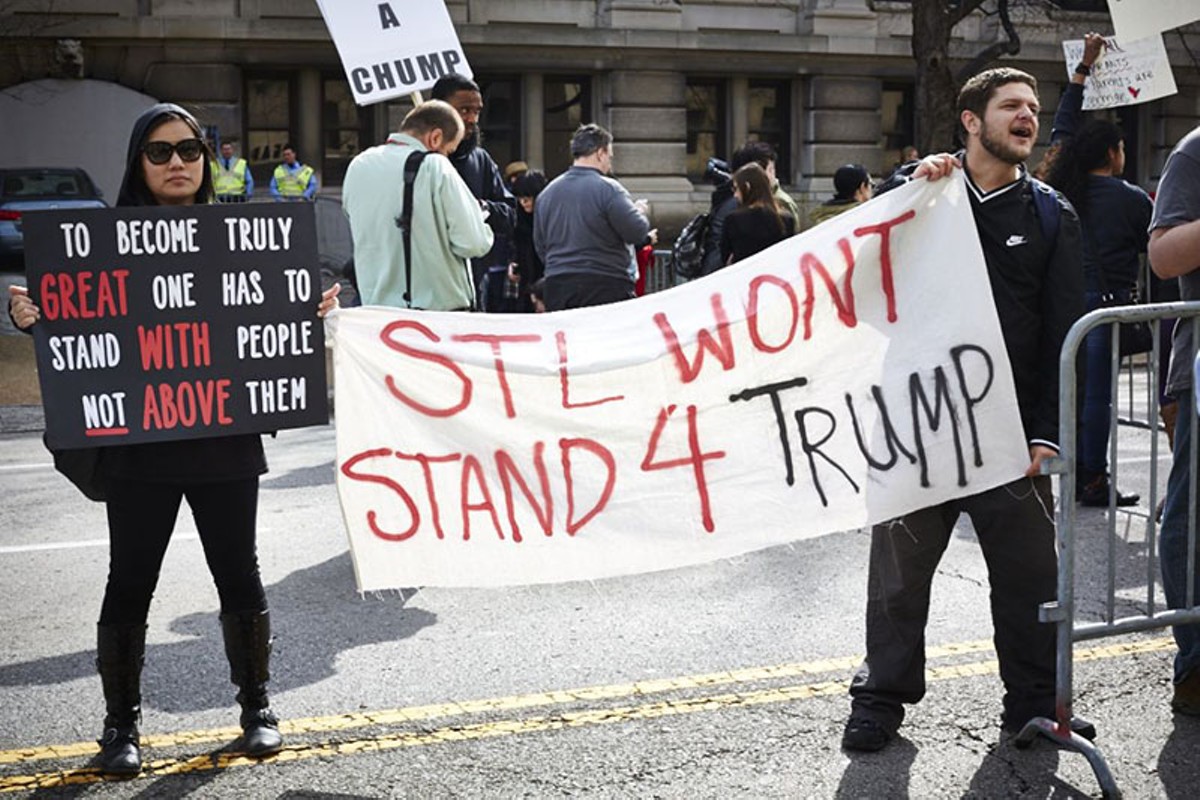
There was a moment not long into Donald Trump's only big campaign rally in St. Louis in which protesters managed to stop the presidential candidate in his tracks. For a full ten minutes, he sputtered and ad-libbed awkwardly while security struggled to remove everyone who was shouting. There were so many of them, and they were so effective, Trump simply couldn't regain control of the room. He seemed genuinely surprised by the wall of resistance he was encountering.
"Missouri, I can't believe this," he said.
The off-the-cuff remark was telling. Trump thought he'd landed in Missouri — reddish-purple Missouri, home of assorted rednecks and deplorable fellow travelers. But he'd really landed in St. Louis. True blue St. Louis, a city committed to a diversity that's anathema to everything the Republican nominee stands for: black and white, gay and straight, refugee and native-born, we live side by side and we make it work. No wonder the protesters around the Peabody Opera House that morning seemed to outnumber the bigots.
The fact is, while the last couple of years have been tough ones, adversity is nothing new when your address is St. Louis. We've endured waves of crime, white flight, corrupt law enforcement, serious racial tension and year after year of bad press coverage. We've been scorned for our weather, our race relations, even the cheese on our pizza. We keep fighting.
The troubles exposed by the 2014 police shooting in Ferguson might have felled a weaker city. Not us. We made changes, squared our shoulders and carried on. We know we have more to do, but we're committed to seeing it through.
And there are glimmers of hope. The only fighting at the Trump rally was stagecraft; outside, protesters and supporters interacted peacefully. Faizan Syed even handed out doughnuts, forcing Trump supporters to put a face to the oft-demonized other (in this case, Muslims).
"We had a lot of people who gave us hugs, they gave us high-fives," he reported a few days later. "They gave us handshakes. One random guy donated $5. He said, 'I love what you're doing, here's five bucks.'"
Within municipal politics, too, change is afoot. The reformers who battled their way onto the Board of Aldermen in 2015 are having a ripple effect. This August, a group of starry-eyed young progressives took on the entrenched Democratic Party establishment — and won a few big victories.
One of the highest-profile races pitted Cherokee Street business owner Bruce Franks Jr. against incumbent state Rep. Penny Hubbard (D-St. Louis). Matriarch of a small dynasty, Hubbard had a record of putting family before community, even voting to protect Doe Run Co. from people alleging harmful lead exposure. Surprise: At the time of the vote, the company had recently hired her son as a lobbyist.
The Hubbard family also had a penchant for racking up victories via absentee ballots. But unlike past candidates, Franks didn't chalk up the absentee irregularities as the way things are done in St. Louis. His lawyer, David Roland, forced the Board of Elections to follow state law — filing two different lawsuits and finally winning in appellate court. The pair's efforts caught the attention of no less than Governor Jay Nixon, who responded to Roland's string of legal victories by booting two top election commissioners.
The most telling moment in the imbroglio came a few weeks before victory, when Hubbard started to realize she had to fight back and chose to get down in the mud to do it. One of her attorneys, state Rep. Mike Colona (D-St. Louis), tried to put Roland on blast on Facebook, alleging that Franks' campaign was really about voter suppression because his lawyer was (gasp!) a libertarian.
Franks' supporters, some of the city's staunchest progressives, weren't having it. They knew Roland had been working without concern for payment and had even crashed at one of their homes during the legal battle, just to have somewhere to stay in St. Louis. When you've broken bread with a guy, it's impossible to dismiss him as the caricature of his political beliefs. They rose to defend the attorney, and ultimately Colona deleted his post.
The St. Louis of 2016 isn't partisan, which may be a rude awakening to the machine that has long counted on people simply voting for the Democrat on the ticket. The divide is no longer black vs. white, north vs. south. Young city residents are reshaping old coalitions. And seeing the energy surrounding Franks and his supporters, it's impossible to imagine that the great shakeup is done yet. The status quo isn't working; we want more for this city we love.
Franks, by the way, crushed his do-over race. Presuming we can survive the presidential election, the 2017 mayoral race ought to be really, really interesting.

For the sixth consecutive election cycle — that's dating all the way back to the ascension of another candidate named Clinton, in 1992 — Washington University has been invited to host the center stage for one of the national election's most pivotal moments: a presidential or vice presidential debate. Overseen by the Commission on Presidential Debates, Donald Trump and Hillary Clinton will duke it out on October 9 over everything from health care to social justice issues to that damn wall, all while being watched live by millions of citizens here and abroad.
What makes Wash U so desirable as a debate location? Is it the school's reputation for high-quality education and discourse? Perhaps it's because St. Louis is a busy city in the center of the country? Maybe the debate commissioners just really like hanging out near Forest Park?
While all of these reasons make sense to us, none of them is good enough for the Washington Post, which posted a bellyaching opinion piece last year decrying St. Louis' debate-hosting dominance. "Maybe it's time to give Wisconsin a shot," the piece argued.
Yeah, and maybe it's time Wisconsin developed schools that regularly rank higher on U.S. News & World Report's "Best Colleges" list (Washington University is No. 15 among national universities this year).
Until then, we'll happily accept hosting one of the most decisive events every four years and forcing the folks who will run our nation to consider flyover country for once. America, we're ready for our close-up. Yes, again.
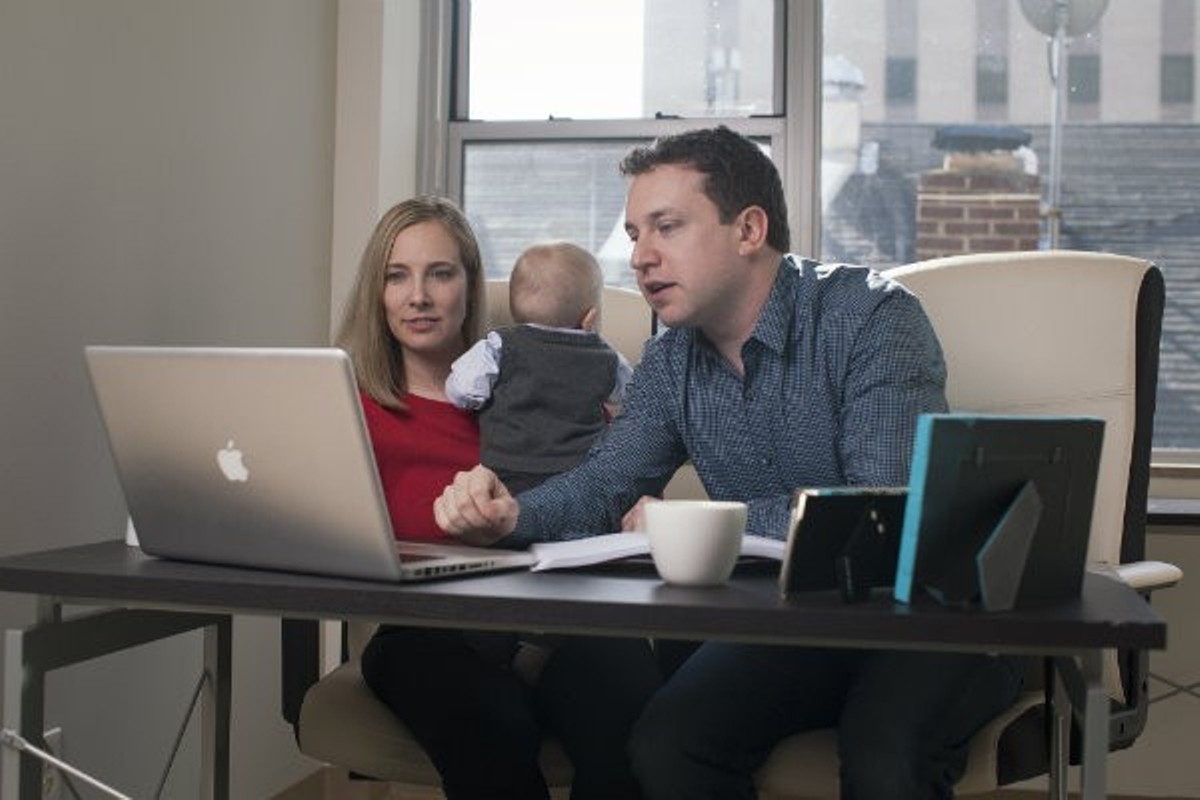
Husband-and-wife team Samantha Rudolph and Jared Miller's downtown startup, Babyation (911 Washington Avenue, 844-744-7867), is doing the unthinkable: It's building a breast pump that doesn't suck. Which might be a slight oversimplification, because its Kickstarter-funded pump still sucks in the literal sense. It just won't be noisy, or require terrible contortions, in order to get milk from boob to bottle. If all goes as planned, it won't even require nursing moms to leave that important board meeting. Babyation's prototype quietly thrums away under your shirt, pumping out milk even as you pump out work. It should hit the market next year.
Before going all-in on Babyation, Rudolph and Miller had been living on the East Coast, and they're up front about the fact that they might never have considered moving back to her hometown had it not been for Arch Grants. The nonprofit gives entrepreneurs living in St. Louis $50,000 in equity-free grants, plus a wealth of pro bono support.
For Babyation, that has made all the difference. "We made more connections in three weeks here than over eighteen months working on this in Connecticut," Miller says. To date, Arch Grants has awarded $4.75 million in total, with 86 new companies funded and trying to become the next big thing. Not all of them are likely to change the world — but if they can help it suck a bit less intrusively, we're not complaining.
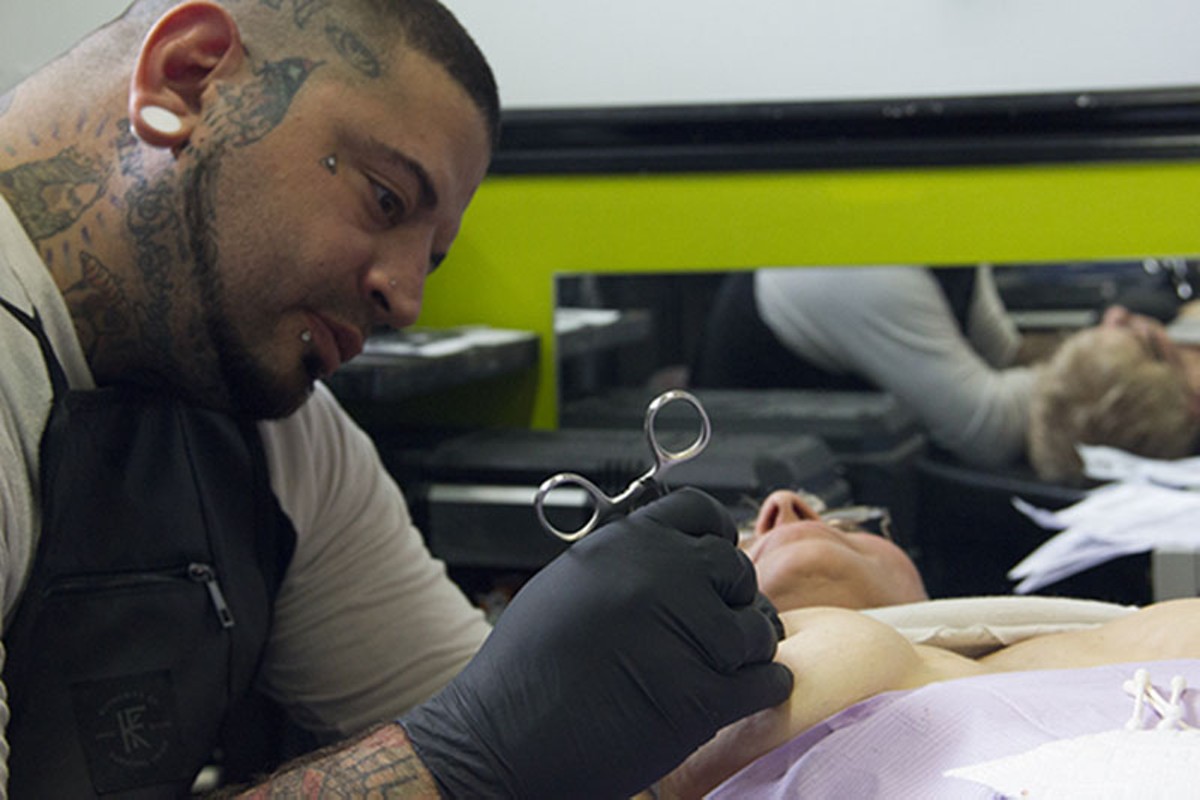
With a face covered in tattoos, Eric Catalano wears his profession on his skin. A body piercer and tattoo artist based in St. Louis and Hecker, Illinois, Catalano also operates a one-of-a-kind service. He restores nipples for women who lost them in life-saving breast cancer surgery.
Crafted from silicone and custom-made to match each woman's body, the prosthetic nipples are a testament to the impact cancer survivors have left on Catalano (find him at eternalink.youcanbook.me).
Starting in 2010, Catalano began tattooing areolas and nipples on women whose breasts had been removed during single and double mastectomies. He listened to their stories about painful skin grafts intended to create new nipples from flesh — but these operations regularly ended in disappointment. Eventually, he'd heard enough. So he applied his own expertise to the problem and invented a solution.
In October 2015, Catalano conducted his first microdermal prosthetic nipple implant on a woman who had sacrificed her nipple in a battle with cancer. Catalano employed the same technique he uses to set jewelry on his customers' skin: A tiny metal post with a socket is inserted just below surface; once healed, the opening serves as an anchor for the bespoke prosthesis.
"I feel complete today," the woman said afterwards.
When he can, Catalano prefers to perform the entire procedure for free. "I feel blessed to have been doing this," he says. With people like Catalano around, we're pretty sure St. Louis can count itself blessed, too.
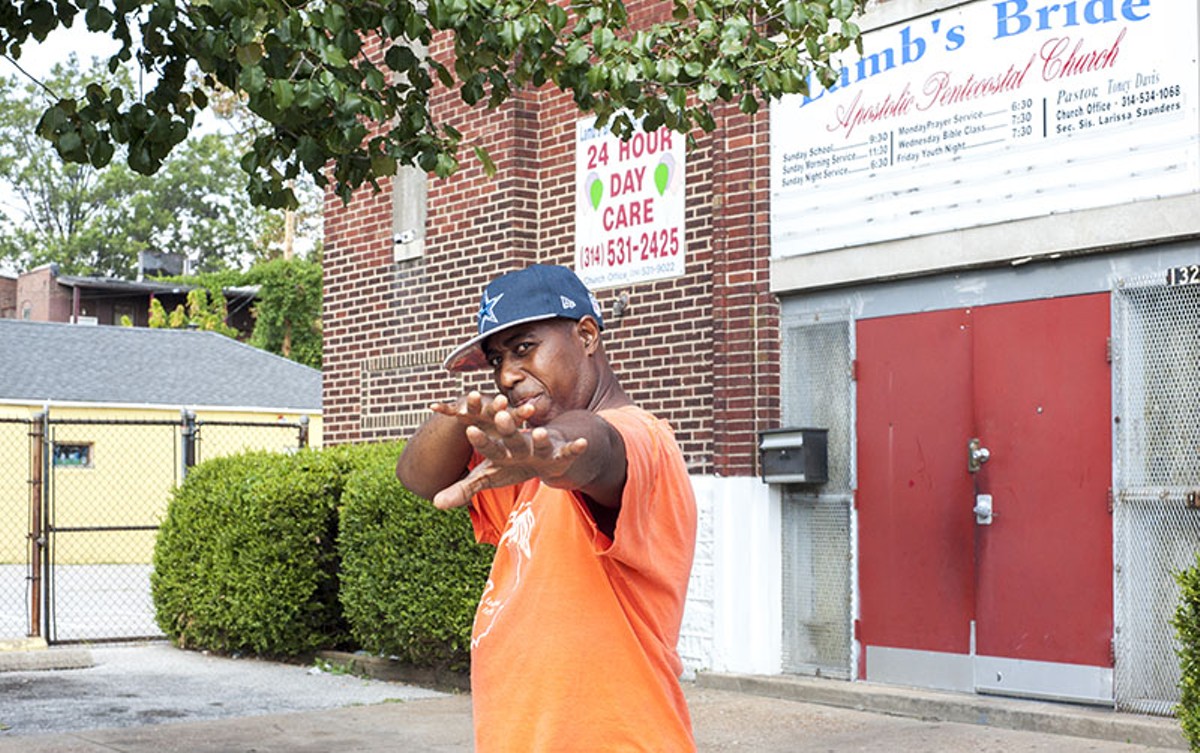
The south city traffic jam on Tower Grove Avenue is a soul killer, and that's not changing any time soon. We'll all have jet packs before they finish rebuilding South Grand, much less Kingshighway. Lucky for us, there is Lewis Claybon.
A 51-year-old daily affirmation in human form, Claybon posts up at 6 a.m. outside of Lamb's Bride Child Care Center (1324 Tower Grove Avenue, 314-531-2425) to watch out for school kids and make your life a little bit better. He waves — two hands if he recognizes you — at every passing car and cyclist. He roars like a lion to make kids laugh. He blows kisses to pretty women.
"Sometimes, I even dance a little for them," he says.
Claybon started his daily routine about twelve years ago. A bachelor with no kids of his own, he noticed a young girl waiting alone for the bus one morning. He stayed out on his porch to make sure she was OK. The next day he did the same, and soon he was watching out for kids every morning in every kind of weather. As long as he was standing out there on the corner, he figured he'd start to wave to the drivers grinding past. People deal with darkness in this world, he knows. Why not try to lighten it? Claybon says you know it's bad when you hear about rich people committing suicide.
"People come through and you never know what they're going through," he says. "I give them a smile and a wave. Don't cost nothing."
He mans the corner until 9 a.m., and then he goes inside Lamb's Bride and works in the kitchen until 1 p.m. He might go across the street to volunteer at Adams Elementary School after that or just walk the neighborhood before returning to the corner for 3 p.m. school dismissal.
He sees you coming, grim-faced in all that traffic, caught up in God-knows-what problems. He waves and smiles. Feel better. Lewis Claybon cares about you.
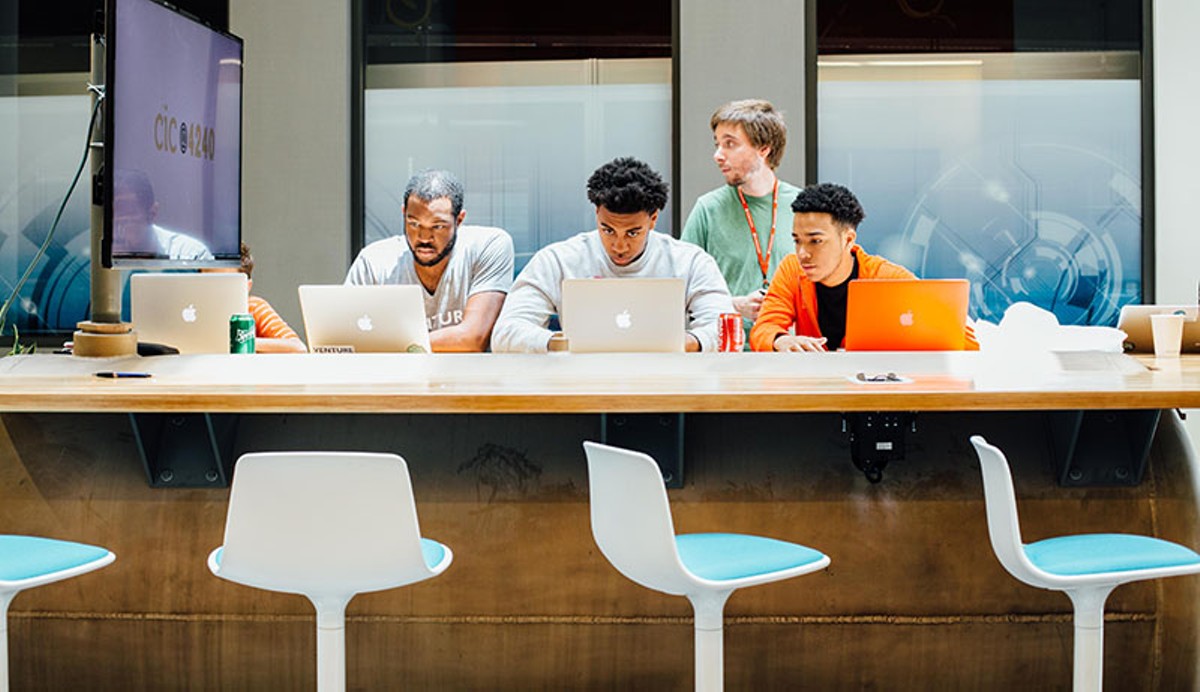
Plenty of brilliant developers throughout St. Louis build fun apps for the hell of it. But what if those geniuses were charged with solving society's problems? And what if they were backed by some serious cash?
GlobalHack (911 Washington Avenue, Suite 657, 314-896-4225) challenges St. Louisans with both, aiming to elevate the Gateway City's stature as a haven for tech startups even while contributing answers to real issues that hold our city back. For 2016, GlobalHack is partnering with St. Patrick Center, compelling participants in a weekend-long hackathon to consider how new tech solutions can help agencies better serve the local homeless population.
To do this, the foundation and event bring together participants from all over the tech realm — engineers, designers and everyone in between — for lots and lots of coding, as well as crash courses in team building, critical thinking and business planning.
The "bettering humanity" angle is pretty sweet, but participants can get more than just warm fuzzies from putting their minds to work. During this year's hackathon, scheduled for October 21 to 23 at Chaifetz Arena, GlobalHack will award $1 million in cash prizes to the teams whose prototype software best advance real-world solutions. That's a huge step up from the $275,000 that's been awarded in total in GlobalHack's previous five events since 2013.
And a big cash infusion isn't the only increase GlobalHack is seeing in 2016. While hackathon divisions for youth, college and professional participants were already up and running, GlobalHack just launched a set of children's programs that give kids hands-on opportunities in computer science and encourage them to explore careers in the tech world. What good is a startup community without bodies to, well, start it up? GlobalHack founders and local entrepreneurs Drew Winship of Juristat, Travis Sheridan of Venture Cafe and Gabe Lozano of LockerDome know that a pipeline of eager, creative students is vital for sustaining an ecosystem of innovation, especially in the oft-overlooked Midwest. And with mentors and partners beside these youngsters, they just may be able to solve the intractable problems that scientists, businesses and politicians have failed to fix for decades.

"Why aren't there more women in computer science?"
The question has been weighing on hiring managers' minds in recent years as companies finally recognize that a diverse lineup of employees often leads to better products. Unfortunately, the answer isn't simple. Everything from marketing PCs specifically to boys in the 1980s to the subsequent absence of female representation in geek culture to flat-out sexism in a male-dominated field has contributed to a situation where women hold only 26 percent of computing-related jobs — and more than half leave those gigs mid-career for less technical, less toxic opportunities, according to a 2015 study from the National Center for Women and Information Technology.
Enter CoderGirl, an initiative from the St. Louis tech nonprofit LaunchCode (4811 Delmar Boulevard), determined to address the gender gap in tech and create a pipeline of talented coders.
CoderGirl aims to change the stereotypical face of programming — admit it: when you hear "computer geek," you probably think of a white dude — by offering free training and networking opportunities to St. Louis women in a collaborative, non-toxic environment. Facilitated by education and community engagement manager Crystal Martin, CoderGirl participants of every skill level pair up with mentors to work on personal and professional coding projects without the hesitancy that women sometimes find in male-skewing learning spaces. Through a combination of weekly online classes and hands-on tinkering, these women build apps and programs that are both useful and creative.
The program is doing more than simply pulling women toward a traditionally male industry, though; it's also introducing even more diversity into that talent pipeline. CoderGirl's go-at-your-own-pace training has become immensely popular with women of color, women at both very young and advanced ages, and women from a variety of economic backgrounds — all of whom are traditionally underrepresented in the tech field and in hiring in general. Participants who successfully complete CoderGirl training at the LaunchCode Mentor Center may apply for LaunchCode apprenticeships with local big-name companies or explore other opportunities for full-time work in programming. With dozens of women taking advantage of CoderGirl's skills training each week, we're betting that the next "women in tech" study will be a bit more encouraging.

In the beginning, Sam Coster and his brothers created the world of Crashlands to be bright, squishy and weird. The PC and mobile game had to be outlandish, they decided, and funny as hell. But above all else, it needed to be big — so big you could get lost there for hours on end. Because while Coster's mind was busy dreaming up characters and bizarre alien fauna to populate the game, his body was busy trying to kill him.
In October 2013, Coster was diagnosed with non-Hodgkin's lymphoma. There is never a convenient time to find out you might be dying, but Coster had just co-founded a game development studio, Butterscotch Shenanigans, and like many indie developers, the young company was feverishly trying to make a name for itself, with simple, goofy titles that could be replayed endlessly.
Then Coster found himself trapped in a hospital bed. He and his brothers scrapped their next planned project. Instead, Coster wanted to make something ambitious, a game that wouldn't "disappear in the blink of an eye." He wanted a game that would take him away from the disease eating his liver, bones and spleen.
"What I needed," Coster says, "was a huge project."
Two months after his diagnosis, and only one day after his first chemo session, Coster went to work on Crashlands. From his hospital bed, he drew more than 1,000 unique items, aliens, monsters, plants and weapons. His brothers, Seth and Adam, built a sprawling world to contain them.
After two years of development, Crashlands launched in January 2016 to critical acclaim; it remains one of the most popular role-playing games ever released on iOS and Android. The player controls Flux, an intergalactic truck driver who finds herself waylaid on a strange planet after her cargo is stolen by a nefarious alien. In her quest to reclaim her stuff, Flux must build shelter, explore territory and defeat local wildlife to gather resources. "Turn their parts against them!" urges an unhinged narrator in the game's launch trailer. "Sew their skin into armor! Grind their bones into weaponry and turn their babies against their former brethren!"
So yes, Crashlands is super weird, but its cartoony aesthetic and 60-hour storyline has put Butterscotch Shenanigans on the map. And after months of intense treatment, and one scary relapse, Coster says he's been given a clean bill of health.
Butterscotch Shenanigans is angling to build on Crashlands' success. The University City-based company has increased its staff by three, and the team is now working on improving the "Crashlands Creator," which puts the same tools used to build the game into players' hands.
"We've had three years of pretty intense struggle," Coster says. "It's not something you can forget about. You're not given an infinite window of time. You need to chose well how to direct your energy, to where you can accomplish whatever you're trying to do."


